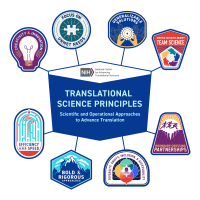
InsideTraCS — with Susan Pusek
InsideTraCS: Get to know your extended research team through a series featuring conversations with faculty and staff.
Susan Pusek, DRSc
Susan Pusek, DRSc, has three decades of experience in clinical and translational research, training, and administration. As Director of Education at NC TraCS, she develops training programs, seminars, and workshops for biomedical researchers and their teams. She also serves as the liaison for research collaborations among local institutions, including Duke University, NC State, and N.C. A&T, with the local RTP community and the CTSA Consortium.
Marla Broadfoot, NC TraCS science writer, recently spoke with Pusek about education's role in building researchers' careers, TraCS' shift from Clinical and Translational Research to Clinical and Translational Science (CTS), and supporting the well-being of individuals in CTS.
I would love to know more about your background. What drew you to science, research, and education? What keeps you interested?
I had a very practical entry into research: I needed a job during my MPH program and the hospital was right across the street from the School of Public Health. I became a student assistant to a nurse coordinator for a clinical trial looking at a drug that stimulated the bone marrow to make white blood cells. The study was in kids who were born with the inability to make neutrophils, a type of white blood cell, and this put them at risk for infections. The drug is now approved today as Neupogen and used widely in cancer treatment. Other drugs I worked on are now in practice, in commercials, and some are even obsolete because we have cures for those conditions.
While I obviously had a very small role in getting these products to market, it was still rewarding to see the process "work." That’s what keeps me interested. One of my neighbors just told me her husband was struggling with cancer treatment and recently started a "miracle drug" that made him feel much better—and the drug was Neupogen!
What role do you think education serves in advancing clinical and translational science (CTS)?
I think education plays a role in every part of the research process from recruiting people into CTS as investigators, team members, and subjects to helping teams conduct their research to teaching the broad community what they found.
We also know that lack of education can contribute to issues with research quality, so ongoing education is important for this too. And finally, continuing education for people doing research often helps inject innovation into their projects and helps them find ways to accelerate a project or find a different career within CTS.
I see that you co-authored a couple of articles about well-being in clinical and translational science. How big of an issue is well-being in the CTS workforce, and what can institutions like TraCS do to better support their scientists?
The original work in well-being was done in response to the pandemic. CTSA educators really mobilized to support all our funded predocs, postdocs, and K Scholars who had a limited time of funding that was being eaten away by lab closures and clinical responsibilities, yet they had to continue making progress in their research to be able to transition off their programs. NIH and other funders wanted some data on what was going on. We found that the pandemic was certainly a hit to productivity for some, but for others it was a time of great productivity and new collaborations.
I think at TraCS we can support the well-being of individuals in CTS in two ways. First, we can go beyond just "answering the question" and help individuals understand the pros and cons of different approaches. Many times people do not know what they should know or ask. We can assume they have a certain degree of knowledge, but adult learners often don’t truly learn something until they need to apply it. By giving researchers insight into why you are recommending a specific approach, we arm them with knowledge that can help them be more resilient if circumstances change and they need to pivot.
"We are in a unique position at TraCS because we benefit from the cumulative experience of so many researchers...we are building careers, not just enabling a single project or grant"
Pusek
The second thing I think we can do is connect people with CTSA resources and/or people who might share their interests, have a tool that could accelerate their research, or know about a new grant opportunity. We are in a unique position at TraCS because we benefit from the cumulative experience of so many researchers. This type of support sends a message that we are building careers, not just enabling a single project or grant, and that creates a sense of community that can contribute to individual well-being.
The new CTSA grant shifted its focus from clinical and translational research to clinical and translational science. It can be tricky to tell the difference between the research and the science. How do you explain the distinction to trainees and fellows? How has your work as director of education programs at TraCS changed as a result of that shift in focus?
NCATS defines translational science as work that overcomes the scientific and operational bottlenecks in the process of doing research. But it can take multiple studies or a thorough literature review to understand whether a bottleneck is unique to you and your environment or is also a challenge for other researchers. So first, we tell people that by doing translational research they may identify a problem in translational science.
The biggest change in our work is trying to balance teaching translational science skills that may not seem immediately relevant to every type of science with enabling discipline-specific projects and grants. That is a difficult shift to make for early-stage investigators who are still trying to master their "domain-specific" knowledge and position themselves for NIH study sections that may not be looking for translational science.
Perhaps instead of investigators doing translational science themselves, we at TraCS could take on that role. We consult with and train people across multiple disciplines, facilitating conversations about common challenges and encouraging collaborations to develop translational science solutions. Those of us who do consults are in an ideal position to recognize patterns in successful teams and identify common obstacles and hopefully, their solutions.
We see some examples of this within the K12 program where scholars from different disciplines review and discuss each other’s work. Some collaborations have emerged from scholars applying tools across disciplines or expanding their work to new populations to test their proposed solutions.
One of the challenges of any institutional program is measuring outcomes. How do you define success? What do you think are the greatest successes of the TraCS educational programs?
We changed the name of our program from Workforce Development to Training and Career Development because success for us means recruiting new audiences to CTS, helping them train for and explore their ideal role in CTS, and increasing their knowledge and application of principles of TS in their work. We also consider it a success if the people we train remain in science. We don’t control all the variables affecting job placement and retention, but we hope that the training they received at TraCS helps them to find the right role and understand how to navigate the environment.
Because many of the activities prior to the new grant were focused on training investigators, by far the greatest successes of TraCS educational programs have been the levels of grant success that translate into people doing innovative science, being retained in research careers, employing new study staff, and mentoring future generations of researchers. In this new grant, we are focusing on different audiences including undergrad students, community college students, and clinical research professionals—so stay tuned for new ideas on success.
NC TraCS is the integrated hub of the NIH Clinical and Translational Science Awards (CTSA) Program at the University of North Carolina at Chapel Hill that combines the research strengths, resources, and opportunities of the UNC-Chapel Hill campus with partner institutions North Carolina State University in Raleigh and North Carolina Agricultural and Technical State University in Greensboro.

